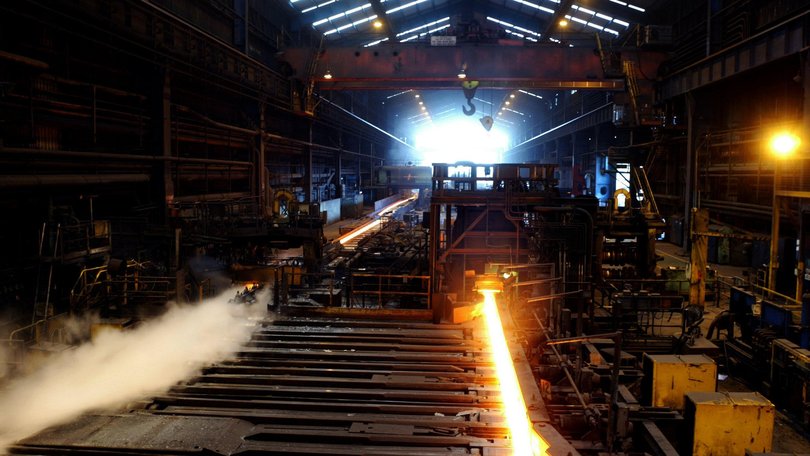Bailout bonanza as Federal Government unleashes industrial-scale cash splash for big business
Anthony Albanese has been warned bailouts and public ownership of failing companies will derail his Government’s productivity agenda and wind the economic clock back decades.

Anthony Albanese has been warned bailouts and public ownership of failing companies will derail his Government’s productivity agenda and wind the economic clock back decades.
The Federal Government’s industrial largesse shifted into overdrive this week with a $135 million cash splash for struggling lead and zinc refiner Nyrstar, backed by South Australia and Tasmania.
Just days later there were reports more metal-makers had their hands out for money and were in talks with Industry Minister Tim Ayres in Sydney mulling plans for the Commonwealth to take ownership stakes.
Sign up to The Nightly's newsletters.
Get the first look at the digital newspaper, curated daily stories and breaking headlines delivered to your inbox.
By continuing you agree to our Terms and Privacy Policy.It signals a looming showdown between Treasurer Jim Chalmers’ hopes to improve productivity at the upcoming economic reform summit against the Prime Minister’s Future Made in Australia manufacturing scheme.
Top AMP economist Shane Oliver warned the bailout plans might leave taxpayers on the hook for decades, taking funds away from debt repayment and community services.
“Government doesn’t have an endless pocket,” he said.
He said putting money into struggling industries would take workers and capital away from stronger sectors, weighing on living standards. That’s at a time when unemployment is low and businesses face staff shortages.
“They (bailouts) are a handbrake on productivity,” Dr Oliver told The Nightly.
“If we want to grow our living standards . . . we need to (lift) productivity.”
Improving productivity means getting more value using less resources, and has been the biggest long-term driver of higher average incomes.
Dr Oliver — who has been an economist more than four decades — pointed to the big reforms of the 1980’s and 1990’s which freed up the economy, increased competition and unlocked better wages.
The bailouts would “start to add up” over time, he said.
“Before you know it we’re nationalising the country again,” he said.
“We seem to have forgotten all those lessons (from past decades), we’re repeating the same mistakes.
“It does seem like we’re turning the clock back a little bit.”
Dr Oliver — who still drives a Holden — admitted he was disappointed when Australia’s auto industry was shuttered in the 2010s.
“I love Holden. But that’s my heart talking,” he said.
“If you want to support local industry, you’ve got to buy it.”
This year alone has seen close to $2.7 billion of taxpayer cash pledged to prop up failing companies. The Federal Government bought $50m of Rex Airlines debt — and was believed to pay full price — in January.
About $2.4b was committed to the Whyalla steelworks.
Yet failed loans by the taxpayer-funded Northern Australian Infrastructure Facility will add to worries that bureaucrats are not well placed to pick winners.
Almost $170m was burned by NAIF when mineral sands miner Strandline Resources hit the wall earlier this year.
The fund — created by the Abbott Coalition Government — dusted $80m at potash play Kalium Lakes and had a near miss when Australian Potash collapsed. NAIF had approved a loan for the potash hopeful but not released any cash.
That did not stop another public authority, the National Reconstruction Fund, snapping up $50m in a Liontown Resources raising this week.
Alarm bells have been ringing at the Productivity Commission about this trend for years.
“While well-designed industry policy can offer benefits, when poorly designed it can be costly for governments, act as a form of trade protection and distort the allocation of Australia’s resources,” Commissioner Catherine de Fontenay said last month.
A spokeswoman for Senator Ayres defended bankrolling Nyrstar, which will help fund new critical minerals processing.
“This investment reflects three governments engaging constructively with Nyrstar on a serious assessment of the viability of critical minerals processing in Australia,” she said.
“Sustainable and competitive smelting capabilities in Australia that can deliver critical minerals projects are part of the Albanese Labor Government’s Future Made in Australia agenda.”
The industry talks on Thursday had been constructive, she said.
“The conversation extended beyond individual facility challenges to focus on collaborative, nationwide solutions aimed at ensuring the long-term sustainability of the sector.”
